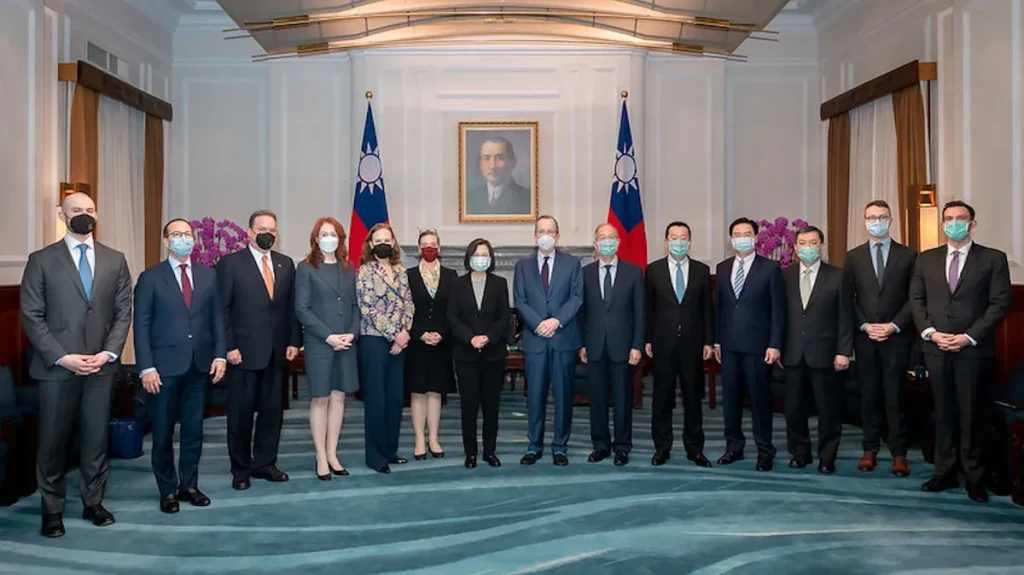In late May 2024, a U.S. congressional delegation visited Taiwan to meet with the newly inaugurated President Lai Ching-te, reinforcing U.S. support for Taiwan in the face of growing Chinese military pressure. The bipartisan delegation was led by Representative Michael McCaul, Chair of the House Foreign Affairs Committee, and included four Republicans—Young Kim, Joe Wilson, Andy Barr—and two Democrats—Jimmy Panetta and Chrissy Houlahan.

U.S. Commitment to Taiwan
Representative Andy Barr, co-chair of the Taiwan Caucus in Congress, reaffirmed the U.S.’s strong commitment to Taiwan’s defense and its democratic system. Speaking at a news conference in Taipei, Barr emphasized that there should be no doubts about America’s resolve to maintain peace and stability in the Taiwan Strait. He highlighted the United States’ military, diplomatic, and economic support for Taiwan, stressing that the American commitment is unwavering and critical for regional security.
McCaul’s Criticism of China’s Actions
McCaul criticized China’s recent military drills around Taiwan, which included sending 110 aircraft and 46 warships, as intimidation tactics aimed at undermining Taiwan’s democracy. He pointed out that these actions demonstrated China’s lack of interest in resolving the Taiwan issue peacefully. McCaul reiterated that the U.S. will continue to support Taiwan by expediting the delivery of defensive weapons, underscoring the importance of deterrence to maintain peace in the region. He also referenced the Taiwan Relations Act (TRA) as a cornerstone of U.S.-Taiwan relations, which mandates the provision of defensive weapons to Taiwan.
China’s Response to U.S Delegations Visit
The Chinese government expressed strong opposition to the congressional visit, claiming it undermined China-U.S. relations and threatened peace and stability in the Taiwan Strait. Chinese Foreign Ministry spokesperson Mao Ning stated that the visit sent a misleading signal supporting Taiwanese independence and violated the U.S.’s commitment to maintain only unofficial relations with Taiwan. Mao reiterated China’s firm opposition to U.S. military ties with Taiwan and urged American lawmakers to cease actions that could escalate tensions.
Support Amid Military Tensions
Taiwan’s new foreign minister, Lin Chia-lung, described the American delegation’s visit as a crucial gesture of solidarity, particularly following China’s aggressive military exercises. He thanked the U.S. lawmakers for their support at this critical time, emphasizing the importance of continued cooperation with the U.S. and other like-minded countries to ensure regional stability and prosperity.
President Lai Ching-te, who succeeded Tsai Ing-wen, echoed similar sentiments, expressing gratitude to McCaul and the U.S. Congress for their long-term support. Lai reassured that his administration would persist in enhancing national defense and maintaining Taiwan’s determination to protect its sovereignty. He noted that the recent Chinese military drills served as a reminder of the ongoing threat and highlighted the necessity of U.S. military support to deter aggression.
Focus on the Defensive Capabilities of Taiwan
McCaul addressed the backlog of U.S. weapon orders for Taiwan, amounting to approximately $20 billion, attributing the delays primarily to issues within the U.S. defense industrial base. He emphasized the critical need for maritime assets over land-based ones to prevent a potential Chinese invasion. McCaul also highlighted recent measures by President Joe Biden, including the signing of grants and Foreign Military Financing loans worth $4 billion to support Taiwan’s defense capabilities.
Bipartisan Unity on Taiwan Support
McCaul assured that U.S. support for Taiwan would continue regardless of the outcome of the upcoming U.S. presidential election, asserting that neither President Joe Biden nor former President Donald Trump would adopt a weak stance on China regarding Taiwan. He emphasized the bipartisan consensus on the importance of supporting Taiwan to counter Chinese aggression and maintain peace in the region.
The U.S. congressional delegation’s visit to Taiwan underscores the robust support from the United States for Taiwan amid rising tensions with China. The delegation’s meetings with Taiwanese officials highlighted the shared commitment to enhancing defense capabilities and maintaining stability in the Taiwan Strait. Despite China’s objections, the visit reaffirms the strong ties between the U.S. and Taiwan and the ongoing efforts to support Taiwan’s sovereignty and democratic system.
